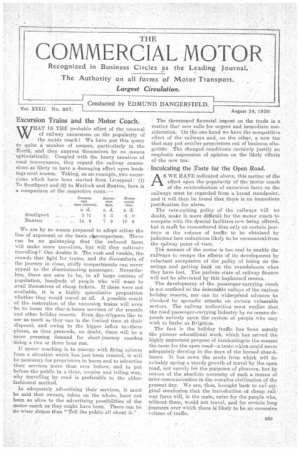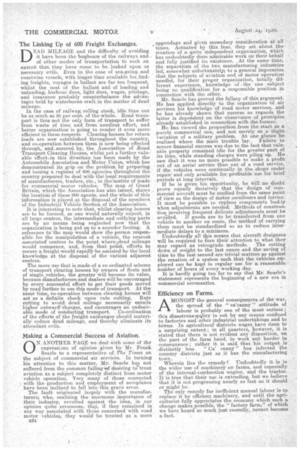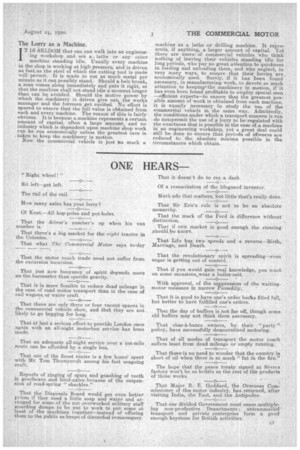Excursion Trains and the Motor Coach.
Page 1

Page 2

Page 3

If you've noticed an error in this article please click here to report it so we can fix it.
WHAT IS THE probable effect of the renewal of IS excursions on the popularity of the motor coach? We have put this query to quite a number of owners, particularly in the Xorth, and they express themselves by no _me.ans optimistically. Coupled with the heavy taxation of road conveyances, they regard the railway concessions as likely to have a damaging effect upon bookings next season. Taking, as an example, two excursions which have been started from. Liverpool: (1) • To Southport and (2) to Matlock and Buxton, here is a comparison of the respective costs :— We are by no means prepared to adopt either the, line of argument. or the basis *comparison. There can be no: gaimaying that the reduced fares will make more travellers, but will they cultivate travelling ? One doubts it. The rush and tumble, the crowds that fight for trains, and the discomforts of the journey in close, stuffy compartments can never appeal to the discriminating passenger. Nevertheless, there are sure to be, in all large centres -of population, hundreds of People who will want to avail themselves of cheap tickets. If these were not available, it is a highly speculative proposition whether they would travel at all. A possible result of the restoration of the excursion, trains will even 'be to boom the ehar-a-banes services of the seaside and other holiday resorts. Even clar trippers like to see as much as they can. in the limited time at their disposal, and owing to the bigger influx to-these places, as time proceeds, no doubt,, there will be a more pressing demand for short-journey coaches -doing a two or three hour run.
If motor coaching is to emerge with flying colours from a situation which has just been created, it will be necessary for proprietors to boom and to advertise their services mere than ever before, and to put before the public in a !clear, concise and telling way, why travelling by road is preferable to the olderfashioned method.
In adequately advertising 'their services, it must be said that owners, taken on the whole, have not been so alive to the advertising possibilities of the motor coach as they might have been.' There can be no wiser slogan than 'Tell the public all about it." . . The threatened financial impost on the trade is a matter that now calls for urgent and immediate consideration. On the one hand we have the competitive effect of the railways and, on the other, a new tax that may put smaller, pro paietors out of business altogether. The Changed conditions certainly justify an emphatic expression of opinion on the likely effects of the new tax.
Inculcating the Taste for the Open .Road.
AS WE HAVE indicated above, this matter of the effect upon the popularity of the Motor coach of the reintroduction of excursion fares on the railways must be regarded from a broad standpoint, and it will then be found that there is no immediate justification for alarm.
The rate-cutting policy of the railways will no doubt, make it more difficult for the.motor coach to compete '‘vitli the Etpecial facilities no being offered, but it intifft be remembered that only on certain journeys is the volume of traffic to be obtained by judicious fare reductions likely to be economicalfrom the railway point of view. The menace of the motor is too real to enable the railways to escape the effects of its development by reluctant acceptance of the policy of losing on the swings and getting back on the roundabouts what they have lost. The parlous state of railway finance will not be alleviated by this haphazard means.
'The development of thepassenger-carrying coach is net confined to the delectable valleys of the various holiday resorts, nor can its widespi'ead advance be checked by sporadic attacks on certain vulnerable sectors. The railway authorities -must realize that the road passenger-carrying industry by no means depends entirely upon the custom of people who may wish to bathe at Brighten.
The fact is the. luiliday traffic has been merely the pioneer educational work, which has served the highly imPortant purpose of inculcatinaqin the masses the taste for the open road—a taste-which could never adequately develop in the days of the horsed' char-&-. banes. It has sown the seeds from which will inevitably spring a sturdy growth of travel by the open road, not merely for the purposes of pleasure, but by reason of the absolute necessity of such a Means of inter-communication in the complex civilization Of the present day. We are, thus, brought back to our ginal conclusion that the introduction-of cheap railway fares will, in the main, cater for the people who, without them, would not travel, and for certain long journeys over which there is likely to be an excessive -.volume, of traffic.
The Linking Up of 600 Freight Exchanges.
DEAD MILEAGE and the difficulty of avoiding it have been the 'bugbears of the railways and of other modes of transportation to such an extentthat they have come to be looked upon as necessary evils. Even in the case of sea-going and coastwise vessels, with longer time available for, finding freights, voyages in. ballast are far too frequent, whilst the cost of the ballast and of loading and unloading y harbour dues, light dues, wages, pilotage, .., and insurance probably counterbalance the advantages held by waterborne craft in the matter of dead
mileage. .
In the case of railwaa, rolling stock, idle time can be as much as 95 per cent. of the whole. Road transport is thus 'not the only form of transport to suffer from -waste of time and from needless effort, and better organizationis going to render it even moreefficient in these respects. Clearing houses for return loads are now established throughout the country, and co-operation between them is now being effected through,. and,. assured by, the Association of Road Transport Clearing Houses, whilst yet a further valuable effortiin this direction. has been made by the Automobile Association and Motor Union, which has demonstrated its grip on the problem. by preparing and issuing a register of 600 agencies throughout the country prepared to deal with the local requirements of manufacturers, traders, etc., in theMatter of loads for commercial motor vehicles. The map of Great Britain, which the Association has also issued, shows the location of these 600 agents,and the whole of this information is placed at the disposal of the members of the Industrial Vehicle Section of the Association.
It is interesting to note that, whilst clearing houses are to be formed, as one would naturally expect, in all large centres, the intermediate and outlying parts are by no 'means being neglected now that the organization, is being got on to a, sounder footing. A reference to.the map would show the person respon • sible for the manipulation of a vehicle, the nearest associated centres to the point where!,dea,d mileage would commence, and, from that point, efforts to secure a freight would rapidli, be assisted by thelocal knowledge at the disposal of the various adjacent centres.
The more use that is made 'of a co-ordinated scheme of transport clearing houses by owners of fleets and of single. vehicles, the greater Will become its value, because Manufacturers and dealers will be encouraged by every successful effort to get their goods moved by road further to use this mode of transport. At the same time,‘-co-operation between clearing houses will act as a definite check upon " rate cutting. Rate cutting to avoid dead mileage necessarily entails higher outward charges, and encourages an undesirable mode of 'conducting transport. Co-ordination of the efforts of the freight exchanges should materially' reduce dead mileage, and thereby eliminate its
attendant evils. • .
Making a Commercial Success of Aviation.
0N ANOTHER PAGE we deal with some of the expressions of opinion given by Mr. Frank Searle to a representative of The Times on the subject of, commercial air services. In turning his attention to this matter, Mr. Searle has not suffered from the contmon failing-4f desiring to treat aviation as a subject completely distinct from motor vehicle operation. Very many of those connected
\ with the production and employment of aeroplanes have been inclined to ,fall into this grave error. The fault originated largely with the manufacturers; who,realizing the enormous importance of their industry, revolted against the idea, in our opinion quite erroneous, that, if they remained in any way associated with those concerned with road motor vehicles, they would *be treated as a more • B24 appendage and given secondary consideration at all times. Actuated by this fear, they set about the Creation of a quite independent organization, which has undoubtedly done admirable work on their behalf and fully justified its existence. At the same time, the separation of the two manufacturing industries led, somewhat unfortunately., to a general impression that the subjects of aviation and of motor operation needed, for their proper organization, totally different experience, knowledge of , the one subject being no qualification for a responsible position in connection with the other.
Mr. Searle has proved the fallacy of this argument. He has applied directly to the organization of air services his knowledge of road motor services, and he has already shown that success as regards the latter is dependent on the observance of principles already established in connection with the former.
He has, viewed the proposition from the start as a purely commercial one, and not merely as a slight variation of a military problem. At one glance he realized where the main trouble lay. Failure to secure financial success was due to the fact that valuable property remained idle for the greater part of its time' while standing charges were piling up. He • saw that it was no more possible to make a profit out of an aerial service than out of a road service, if the vehicles were continually in the shops under repair and only available for profitable use for brief periods at long intervals. If he is given his opportunity, he Will no doubt prove equally decisively that the design of commercial aircraft must be studied from the same point of view as the design of motor omnibuses and lorries. It must be possible to replace components bodily when adjustments are needed. Methods of construetion involving frequent delicate adjustments must be aye-Wed. If goods are to be transferred from one vehicle to another en route, the method of carrying them must be standardized so as to reduce intermediate delays to a minimum.
Undoubtedly all this means, that aircraft designers will be required to turn their attention to what they may regard as retrograde methods. The cutting down of weight to the last ounce and the saving of time to the last second are trivial matters as against the creation of a system such that the vehicles employed can be kept in regular use for a, reasonable number of hours of every working day. It is hardly going too far to say that Mr. Searle's statement represents the beginning of a new era in commercial aeronautics.
Efficiency on Farms.
AMONGST the general consequences of the war, the spread of the " ca'canny " attitude of labour is probably one of the most serious ; this disa,strousapelicy is not by any means confined to factories and other industrial undertakings and to towns. In agricultural districts wages' have risen to a surprising extent ; in all quarters, however, it is stated that there is not evident any disposition, on the part of the farm hand, to work any harder in consequence; rather it is said that his output is
distinctly less. " Ca' canny" has infected the country districts just as it has the Manufacturing town..
Wherein lies the remedy ? Undoubtedly it is in the wider use of machinery on fa/ins, and especially, of the internal-combustion engine, *and the tractor. -It is true that their use is extending, but we believe that it is not progressing nearly as fast as it should or might be.
The only remedy for inefficient manual labour is to replace it by efficient machinery, and until the agriculturist fully appreciates the economy which such a change makes possible, the "factory farm," of which we have heard so. much just recently, cannot become a fact,
The Lorry as a Machine.
IT IS SELDOM that one can walk into an engineer. ing workshop and see a, lathe or any other machine standing idle. Usually every machine in the shop is working at high pressure, and is driven as fast.as the steel of which the cutting tool is made will permit. It is made to nut as much metal per minute as it can possibly stand. Should a belt break, a man comes along immediately and puts it right, so that the machine shall not. stand idle a moment longer than can be avoided. Should the motive power by which the machinery is driven give out, the works manager and the foremen get excited. No effort is spared to ensure that the full value is obtained from each and every machine. The reason of this is fairly obvious. It is because a, machine represents a. certain amount of capital, often a large amount, and no industry which is dependent upon machine shop work can be run economically unless the greatest care is .taken to keep the machinery in motion.
Now the commercial vehicle is just ies much a
machine as a lathe or drilling machine. It represents, if anything, a larger amount of capital. Yet there are usersi of commercial vehicles who think nothing of leaving their vehicles standing idle for long periods, who pay no great attention to quickness in loading and unloading them, and who neglect, in very many ways, to ensure that their lorriesare _ economically used. Surely, if it has been found necessary, in manufacturing work, to devote.so much attention to keepingrthe machinery ' in motions if it has even been found profitable to employ special men —efficient experts—to ensure that the greatest possible amount of work is obtained from each machine, it is equally necessary to study the use of the commercial vehicle in. the same way. Admittedly, the conditions .under which a transport concern is run do nottpermit the useof a lorry to be.regulated with the exactness that is possible in the case of-a machine in an engineering workshop, yet a great deal could still be done to ensure that periods ,of idleness are reduced to the absolute minima possible in the circumstances which obtain.




























